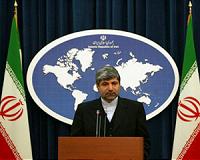| . |  |
. |
Tehran (UPI) Jan 18, 2009 The Jan. 12 assassination of Iranian physicist Masoud Ali-Mohammadi remains shrouded in mystery. The Iranian regime, facing unprecedented political domestic opposition over last June's disputed presidential election, has named Israel's Mossad intelligence service as the most likely culprit, aided by the Americans and British. The Israelis' supposed objective: to sabotage Iran's controversial nuclear program. But in the Middle East, where conspiracy theories are a cultural pursuit, there's now another scenario. The Mossad is still the culprit, but its motivation is far murkier -- derailing the tortuous negotiations between Tehran and the West concerning Iran's nuclear project, and thus to clear the way for an Israeli attack on Iran. The Israelis have long opposed these negotiations set in motion by U.S. President Barack Obama, who favored a diplomatic solution to the problem. The Israelis, who view a nuclear-armed Iran as an existential threat, have urged pre-emptive strikes to knock out Iran's key nuclear facilities. Obama has convinced them to give diplomacy a chance. The Israelis gave him until the end of last year to secure a settlement. Failing that, they would take matters into their own hands. The way the Israelis see it, the talks are simply allowing the Iranians to buy time to acquire enough enriched uranium for nuclear weapons and to develop ballistic missiles capable of delivering them. So where does the unfortunate Ali-Mohammadi fit into this arcane calculus? He was killed a week ago when a bomb attached to a motorcycle exploded outside his Tehran home, detonated by remote control. The regime has gone to great lengths to suggest that Ali-Mohammadi was "martyred in a terrorist operation by counter-revolutionary agents affiliated" with Israel and the West seeking to sabotage that program, and that he was part of that program. But Ali-Mohammadi was not part of the program. He was an astrophysicist at Tehran University. A review of his work shows that he had published three or four papers a year on theoretical physics since 1993. Specialists in that field allege that none of his papers had any direct application to a nuclear weapons program, although there were some possible tangential connections. His work was almost entirely academic. Further, if he had been involved in the nuclear program, it is unlikely that he would have not been provided with personal security, in light of the assassination or defection of scientists attached to the program in recent years. It was also found that he was no great fan of the regime anyway. Indeed, he was a firm supporter of opposition leader Mir Hossein Mousavi. Ali-Mohammadi was one of 240 academics who signed a statement of support for Mousavi during his run for the presidency in June -- an election the opposition says was massively rigged by the incumbent Mahmoud Ahmadinejad. It is highly unlikely that with those political leanings the regime would want Ali-Mohammadi anywhere near the maximum-security nuclear program. That raised the suspicion that the regime killed him as a warning to other academics and intellectuals, particularly dissident scientists, not to back Mousavi and the opposition in their campaign of street protests against Ahmadinejad and his cohorts. That scenario still has traction, particularly since the regime's crackdown on the opposition is becoming steadily more violent because Mousavi's so-called Green Revolution and its supporters refuse to be intimidated. But this convoluted plot has now led some to suspect that the Israelis may have killed Ali-Mohammadi after all -- but not in an effort to decapitate the nuclear program. The intention was, so this theory goes, to make it impossible for the negotiations with the United States and its allies to proceed, thus giving Israel the opening it sought to take unilateral military action against Iran. "Inside Iran, the political effect of the assassination is to blur the ideological distinctions between the Greens and their opponents in the government -- and blunt the U.S. administration's covert effort to carry out 'regime change' short of invasion," argues Justin Raimondo, editorial director of Antiwar.com. "The Israelis are well aware that the Greens are just as nationalist and intransigent on the subject of Iran's right to pursue nuclear research as the hardliners. "They therefore have every interest in destabilizing this movement, sowing fear among prominent Green supporters -- such as Ali-Mohammadi's academic colleagues -- and also spreading the rumor that domestic assassins struck him due to his support for Mousavi."
Share This Article With Planet Earth
Related Links Learn about nuclear weapons doctrine and defense at SpaceWar.com Learn about missile defense at SpaceWar.com All about missiles at SpaceWar.com Learn about the Superpowers of the 21st Century at SpaceWar.com
 Iran mocks powers' failure to agree sanctions as 'natural'
Iran mocks powers' failure to agree sanctions as 'natural'Tehran (AFP) Jan 17, 2010 Iran said it was "natural" that world powers failed to reach a decision about new sanctions against the Islamic republic over its nuclear drive, state media reported on Sunday. "The failure of the 5+1 meeting is natural," Iranian foreign ministry spokesman Ramin Mehmanparast was quoted as saying in a report by the official IRNA news agency. He was referring to a New York meeting on Satur ... read more |
|
| The content herein, unless otherwise known to be public domain, are Copyright 1995-2009 - SpaceDaily. AFP and UPI Wire Stories are copyright Agence France-Presse and United Press International. ESA Portal Reports are copyright European Space Agency. All NASA sourced material is public domain. Additional copyrights may apply in whole or part to other bona fide parties. Advertising does not imply endorsement,agreement or approval of any opinions, statements or information provided by SpaceDaily on any Web page published or hosted by SpaceDaily. Privacy Statement |